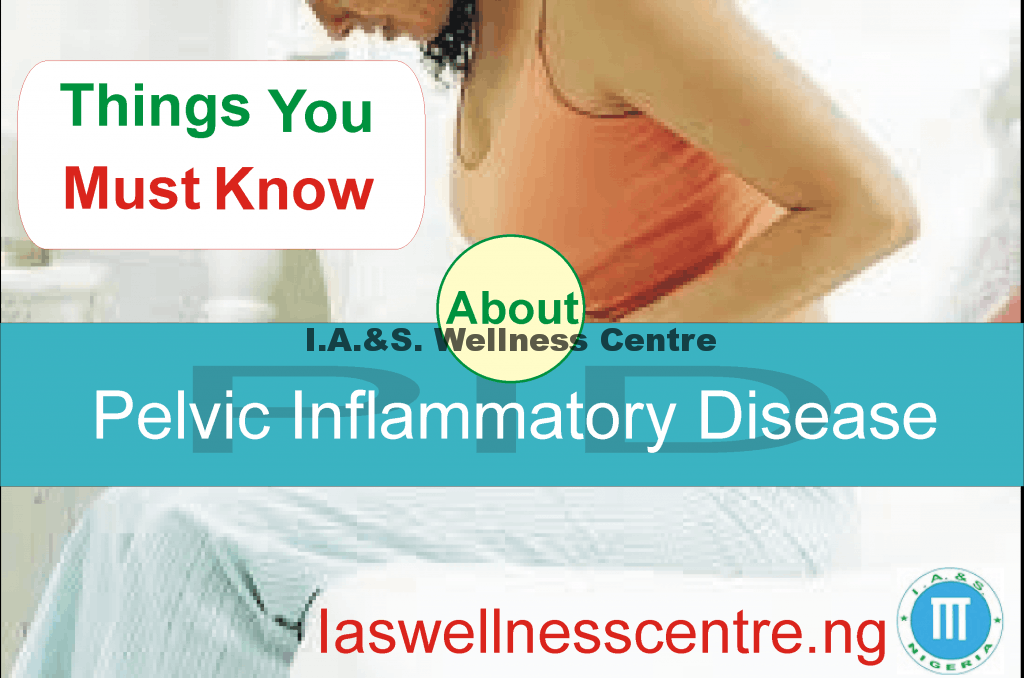WHAT IS PELVIC INFLAMMATORY DISEASE
Pelvic inflammatory disease (PID) is an infection of the female reproductive organs. It usually occurs when sexually transmitted bacteria spread from your vagina to your uterus, fallopian tubes or ovaries.
Pelvic inflammatory disease often causes no signs or symptoms. As a result, you might not realize you have the condition and get needed treatment. The condition might be detected later if you have trouble getting pregnant or if you develop chronic pelvic pain.
1. HOW DO YOU KNOW IF YOU GET PELVIC INFLAMMATORY DISEASE?
To diagnose PID, doctors usually do a physical exam to check for signs of PID and test for STIs. If you think that you may have PID, see a doctor or nurse as soon as possible. If you have pain in your lower abdomen, your doctor or nurse will check for: Unusual discharge from your vagina or cervix.
2. WHAT CAUSES PID WHEN NOT AN STD?
A woman can get PID if bacteria move up from her vagina or cervix and into her reproductive organs. Many different types of bacteria can cause PID. Most often, PID is caused by infection from two common STIs: gonorrhea and Chlamydia. You can also get PID without having an STI.
3. HOW DO YOU GET RID OF PELVIC INFLAMMATORY DISEASE?
Our pelvic inflammatory solution kits will get rid of your PID without negative side effect
4. CAN PID GO AWAY ON ITS OWN?
NO, if PID is diagnosed early, it can be treated. The longer you wait to get treated, the more likely it is that you will have complications from PID.
5. CAN A URINE TEST DETECT PELVIC INFLAMMATORY DISEASE?
A positive test for Chlamydia or gonorrhea supports the diagnosis of PID. As PID can be difficult to diagnose, other tests may also be required to look for signs of infection or inflammation, or to rule out other possible causes of your symptoms. These tests may include: a urine or blood test.
6. WHICH MEDICINE TREAT PELVIC INFLAMMATORY DISEASE?
The best and easiest way to treat PID is by using our pelvic inflammatory solution kits.
7. WHAT ARE THE SYMPTOMS OF PID IN A FEMALE?
Signs and symptoms of pelvic inflammatory disease include:
Pain in your lower abdomen and pelvis.
Heavy vaginal discharge with an unpleasant odor.
Abnormal uterine bleeding, especially during or after intercourse, or between menstrual cycles.
Pain or bleeding during intercourse.
Fever, sometimes with chills.
8. CAN YOU TELL IF YOU HAVE PID FROM A PAP SMEAR?
Diagnosing PID. PID can be hard to diagnose because its symptoms often resemble those of other conditions, such as appendicitis. A pelvic exam is the first step in diagnosing PID, to determine if your uterus and other reproductive organs are affected. You may have a Pap smear to check for gonorrhea or Chlamydia.
9. CAN PELVIC INFLAMMATORY DISEASE MAKE YOU INFERTILE?
Pelvic inflammatory disease, or PID, is an infection of a woman’s reproductive organs . Treating PID right away is important, because PID can cause scar tissue in the pelvic organs and lead to infertility. It can also cause other problems, such as pelvic pain and tubal (ectopic) pregnancy.
10. CAN PID GIVE YOU CANCER?
Although HPV spreads together with agents causing pelvic inflammatory disease (PID) with complaints forcing the patient to seek medical advice, PID has not yet been evaluated as a predictor of cervical cancer. This suggests that patients suffering from PID apparently have a higher risk of cervical cancer.
11. CAN PID LEAD TO DEATH?
Months or years after an acute infection, infertility or ectopic pregnancy can result if your fallopian tubes were damaged or clogged by scar tissue. PID can also cause chronic pain from adhesions or lingering infection. In the most extreme cases, untreated PID can result in death.
12. ARE SYMPTOMS OF PID CONSTANT?
5 Signs That You May Have Pelvic Inflammatory Disease.
Lower Abdominal or Pelvic Pain.
Vaginal Discharge with an Odor.
Painful Urination.
Fever Over 101 Degrees.
Pain During Intercourse.
13. CAN YOU GET PELVIC INFLAMMATORY DISEASE IF YOU ARE NOT SEXUALLY ACTIVE?
Many kinds of bacteria can cause PID. The most common bacteria are two sexually transmitted diseases (STDs), gonorrhea and Chlamydia. But, bacteria that are usually found in the vagina may also cause PID. But, not everyone gets PID by having sex.
14. CAN PID COME BACK AFTER TREATMENT?
If the infection returns. Even after treatment, PID can come back. This could happen if you’re infected by another STI. But be aware that once you’ve had PID, bacteria that are normally harmless may be more likely to infect your upper genital tract.
15. WHAT HAPPENS IF PELVIC INFLAMMATORY DISEASE IS UNTREATED?
Untreated pelvic inflammatory disease might cause scar tissue. You might also develop collections of infected fluid (abscesses) in your fallopian tubes, which could damage your reproductive organs. Other complications might include: Ectopic pregnancy.
16. HOW DO YOU GET A PELVIC INFLAMMATORY DISEASE?
A woman can get PID if bacteria move up from her vagina or cervix and into her reproductive organs. Many different types of bacteria can cause PID. Most often, PID is caused by infection from two common STIs: gonorrhea and Chlamydia.
17. CAN BV CAUSE PELVIC INFLAMMATORY DISEASE?
Bacterial vaginosis (BV) is a drop in the vagina’s “good” organisms and an increase in its potentially “bad” organisms. When this happens and the problem organisms spread into the uterus and fallopian tubes, PID can result. BV is not sexually transmitted.
18. CAN YOU GET A STD FROM A BACTERIAL INFECTION?
BV is the most common vaginal infection affecting young women. Although it’s not considered a sexually transmitted disease (STD), the chances of developing bacterial vaginosis seem to increase with the number of sexual partners a woman has. You don’t need to be having sex to get BV, though.
19. WHY DO I KEEP GETTING A BACTERIAL INFECTION?
BV is caused by changes in the amount of certain types of bacteria in your vagina. BV is common, and any woman can get it. BV is easily treatable with natural medicines. If left untreated, it can raise your risk for sexually transmitted infections (STIs) and cause problems during pregnancy.
20. WHY DO I KEEP GETTING YEAST INFECTIONS EVERY MONTH?
Yeast infections are caused by overgrowth of a fungus called Candida. … It’s not uncommon to get yeast infections around your period because the pH balance of your vagina changes then. But it’s possible that rather than developing a new infection each month, the previous infection was never resolved.
21. WHAT ARE THE CAUSES OF PELVIC INFLAMMATORY DISEASE
A number of factors might increase your risk of pelvic inflammatory disease, including:
-Being a sexually active woman younger than 25 years old
-Having multiple sexual partners
-Being in a sexual relationship with a person who has more than one sex partner
-Having sex without a condom
-Douching regularly, which upsets the balance of good versus harmful bacteria in the vagina and might mask symptoms
-Having a history of pelvic inflammatory disease or a sexually transmitted infection
22. WHAT ARE THE COMPLICATIONS OF PELVIC INFLAMMATORY DISEASE
- Ectopic pregnancy.PID is a major cause of tubal (ectopic) pregnancy. In an ectopic pregnancy, the scar tissue from PID prevents the fertilized egg from making its way through the fallopian tube to implant in the uterus. Ectopic pregnancies can cause massive, life-threatening bleeding and require emergency medical attention.
- PID might damage your reproductive organs and cause infertility — the inability to become pregnant. The more times you’ve had PID, the greater your risk of infertility. Delaying treatment for PID also dramatically increases your risk of infertility.
- Chronic pelvic pain.Pelvic inflammatory disease can cause pelvic pain that might last for months or years. Scarring in your fallopian tubes and other pelvic organs can cause pain during intercourse and ovulation.
- Tubo-ovarian abscess.PID might cause an abscess — a collection of pus — to form in your uterine tube and ovaries. If left untreated, you could develop a life-threatening infection.
So, How Can I.A.& S. Wellness Centre Help Me To Solve My Pelvic Inflammatory Disease Problem?
The Best And Working Solution Is:
PELVIC INFLAMMATORY DISEASE SOLUTION KITS
FOR MORE DETAILS ON OUR PELVIC INFLAMMATORY DISEASE TREATMENT
OUR ADDRESS:
3rd Floor, 473, Lagos-Abeokuta Express Way, Old UBA Building Beside NNPC,, U-turn Bus Stop, Abule Egba, Lagos, Nigeria.
Mon – Friday (9.00 a.m. – 5.00 p.m.) Nigerian Time
Saturday (10.00 a.m. – 2.00 p.m.) Nigerian Time
Our Office is Close on Sunday but you can Whatsapp, Call, Email Us.
WHATSAPP: (+234)-8038690104
CALL: 08038690104 OR +234-8038690104
OTHER TREATMENT WE OFFER:
The following are some of the treatments we offer Alphabetically (A-Z):
- Abdominal pain Natural treatment
- Abnormal Vaginal bleeding Natural treatment
- Acquired Immunodeficiency Syndrome(AIDS) natural treatment
- Adhesion natural treatment
- Amenorrhea Natural treatment
- Anemia natural treatment
- Arteriosclerosis and Atherosclerosis Natural treatment
- Appendicitis Natural treatment without surgery
- Asthma Natural treatment
- Candidiasis Natural treatment
- Cancer Natural treatment
- Cervical Polyps Natural treatment
- Cholesterol Natural treatment
- Chlamydia Infection Natural treatment
- Fibroids Natural Treatment (without surgery)
- Female Infertility Natural treatment
- Fibrocystic Breast Natural Treatment
- Male infertility Natural treatment
- Menopause Natural treatment
- Mouth odor and Cancer Natural treatment

